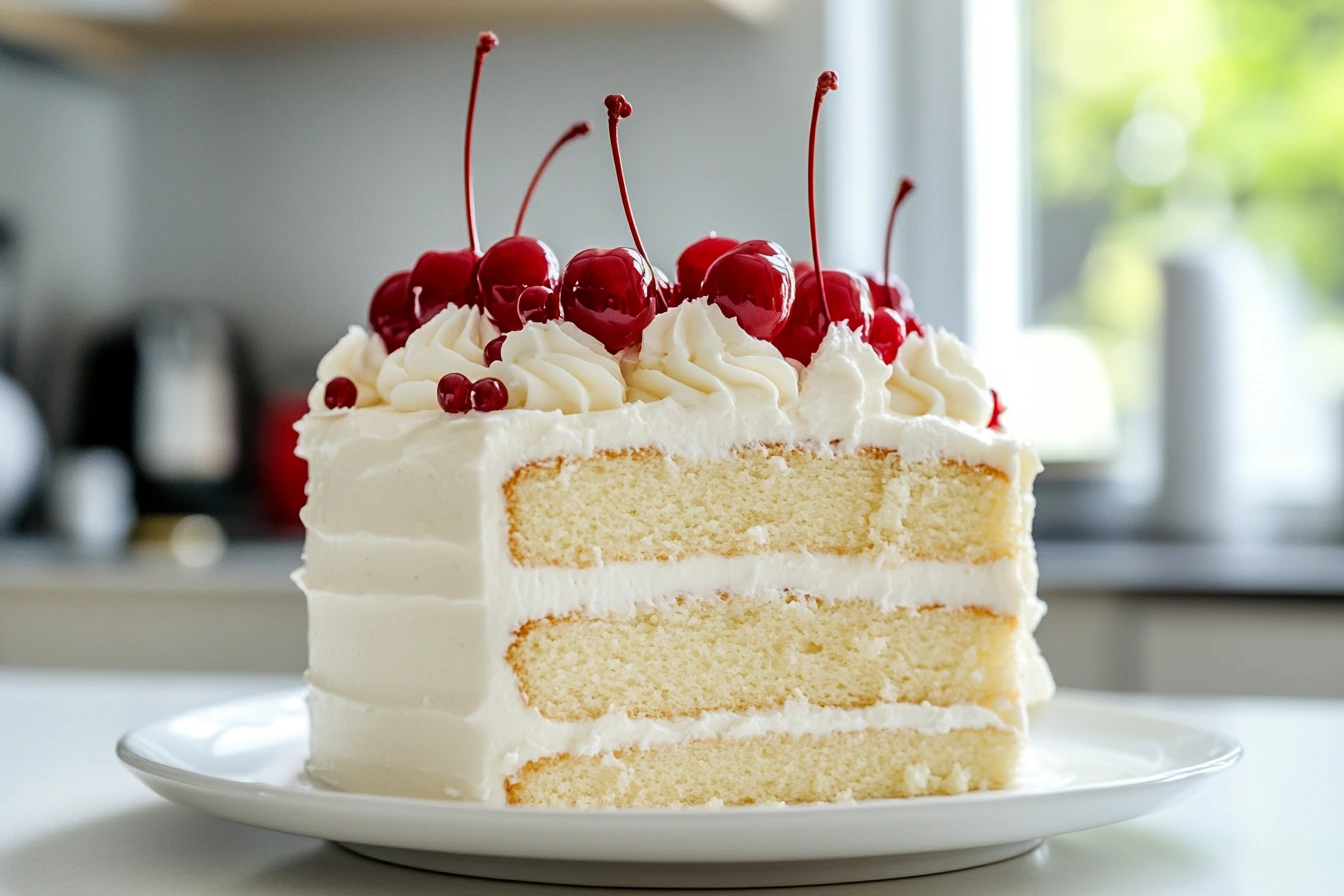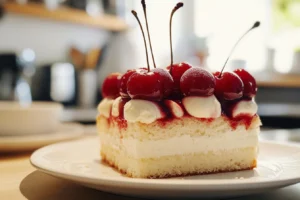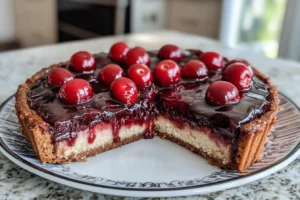Introduction and Meaning
Introduction to the Idiom “Cherry on the Cake
Idioms are a fundamental part of the English language. They enrich communication, adding color and cultural nuance. One such idiom is “the cherry on the cake,” which vividly expresses the idea of perfection or an additional benefit.
You can think of it like preparing a dessert much like deciding what type of cream is best for crème brûlée to ensure perfection.
- Idioms, in general, are figurative expressions that go beyond their literal meaning.
- They are often used to convey complex thoughts in a simple and relatable way.
For example, imagine celebrating a great success. If something unexpectedly wonderful happens during that celebration, you might say it was “the cherry on the cake.”
This idiom has a positive connotation and is frequently used in both spoken and written English to emphasize something special or extra that completes an already satisfying situation.
Origin and Background of the Idiom
Understanding the origin of idioms can offer fascinating insights into their cultural and historical context. While the exact origins of “the cherry on the cake” remain unclear, it likely stems from the tradition of garnishing cakes with cherries.
- During the 19th century, cakes were often decorated with icing, and adding a cherry on top symbolized an extra touch of elegance.
- This culinary practice inspired the metaphor, suggesting that the “cherry” was a finishing touch to something already delightful.
Similar phrases exist in various cultures, highlighting its universal appeal:
- In French: “La cerise sur le gâteau.”
- In Italian: “La ciliegina sulla torta.”
- These idioms carry the same meaning: a final detail that makes something perfect.
This shared usage across languages indicates how food-related metaphors resonate globally.
Literal vs. Figurative Meaning
The phrase “cherry on the cake” has both a literal and figurative meaning:
- Literal Meaning: In baking, adding a cherry on top of a cake provides a final, decorative touch. The cake is already complete, but the cherry enhances its appeal.
- Figurative Meaning: Figuratively, this idiom refers to an extra benefit or a final positive detail that improves an already good situation.
Examples to Clarify Usage:
- “Winning the championship was amazing, but being named the MVP was the cherry on the cake.”
- “The weekend trip was perfect. The sunny weather was the cherry on the cake.”
Transitioning to Similar Idioms
Idioms like “the cherry on the cake” often have close variations in English. For example:
- “The icing on the cake” conveys a similar idea, emphasizing an additional positive element.
- “The finishing touch” also aligns with the idiom’s meaning, highlighting the final perfect detail.
However, while “icing on the cake” and “cherry on the cake” are similar, the former suggests something essentially improving a situation, whereas the latter indicates a minor but delightful addition.
Summary
To summarize:
- The idiom “cherry on the cake” signifies a final, delightful detail that makes something perfect.
- Its origins stem from traditional cake decoration, which gave rise to its figurative meaning.
- This idiom shares connections with other expressions like “icing on the cake” and “the finishing touch,” but it has a unique, subtle nuance.
Understanding idioms like this enriches language usage and adds vibrancy to communication.
Usage in Modern Language
Meaning of “The Cherry on the Cake” in Everyday Language
The idiom “the cherry on the cake” holds a special place in conversational English. It is used to emphasize a final, pleasant detail that enhances an already good situation. People often use this phrase to describe events or outcomes that exceed expectations.
For instance:
- “I got a promotion today, and the bonus was the cherry on the cake!”
- “The party was amazing, and the surprise guest was truly the cherry on the cake.”
This expression works beautifully when highlighting something unexpected yet delightful.
Why Do People Use It?
- To describe a positive, finishing touch that perfects a situation.
- To convey happiness about something additional that improves an already great outcome.
- To add imagery and emphasis to conversations, making language more engaging.
Examples of “Cherry on the Cake” in Different Contexts
Idioms like “the cherry on the cake” are versatile and can be used in various situations. Here are practical examples across different aspects of life:
-
Personal Life:
- “The weekend trip to the beach was fantastic, and the sunset view was the cherry on the cake.”
- “After working hard on my fitness, losing those last few pounds felt like the cherry on the cake.”
-
Work and Career:
- “Getting recognized by the CEO after completing the project was the cherry on the cake.”
- “The salary raise was unexpected but definitely the cherry on the cake.”
-
Entertainment:
- “The movie’s plot was excellent, but the surprise ending was the cherry on the cake.”
- “The live performance was great, and the encore song was the cherry on the cake.”
-
Sports:
- “Winning the championship was special, but scoring the winning goal was the cherry on the cake.”
- “Her outstanding performance in the finals was truly the cherry on the cake.”
-
News and Media:
- “The recent trade deal brought economic relief, and the job creation was the cherry on the cake.”
- “The interview revealed incredible insights, and the guest’s humor was the cherry on the cake.”
These examples demonstrate how this idiom can effortlessly apply to a variety of situations, enriching the conversation with positivity.
Similar Idioms and Comparisons
The idiom “the cherry on the cake” often gets compared to other phrases with a similar meaning. Here’s how it relates:
- “Icing on the Cake”
- Both idioms highlight an additional benefit.
- “Icing on the cake” suggests something that substantially improves the situation.
- In contrast, “the cherry on the cake” refers to a smaller, delightful touch that completes perfection.
Example:
- “The beautiful decorations were the icing on the cake, but the live music was the cherry on the cake.”
- “The Finishing Touch”
- This phrase refers to the final detail that completes something.
- It focuses on completion rather than improvement.
Example:
- “Adding a personal message to the gift was the finishing touch that made it perfect.”
- Other Similar Expressions:
- “A feather in one’s cap” – Represents an achievement or success.
- “The pièce de résistance” – A remarkable or standout feature in something already great.
Regional Variations
Interestingly, idioms with similar meanings appear in other languages:
- French: “La cerise sur le gâteau”
- Italian: “La ciliegina sulla torta”
- Spanish: “La guinda del pastel”
These variations demonstrate the universal appeal of food metaphors in conveying satisfaction and perfection.
Why Idioms Like This Are Important
Idioms such as “the cherry on the cake” add vibrancy to language. They allow speakers to express emotions, thoughts, and experiences in a concise and creative way.
- They make conversations engaging and relatable.
- They provide cultural insights into how expressions evolve.
- They simplify complex ideas into memorable phrases.
Using such idioms not only enhances spoken English but also enriches written communication. Therefore, understanding and mastering idioms can make language learning both fun and effective.
Cultural and Linguistic Perspective
Use of “Cherry on the Cake” in Other Languages
The idiom “the cherry on the cake” is not unique to English. Its meaning transcends linguistic boundaries, appearing in multiple cultures with slight variations. This reflects the universal appeal of food-related metaphors. Here are notable examples:
- French: “La cerise sur le gâteau”
- Directly translates to “the cherry on the cake.”
- It carries the same meaning: a final, pleasant detail that perfects something.
- Example: “L’invitation à dîner était parfaite, et la vue incroyable était la cerise sur le gâteau.”
(“The dinner invitation was perfect, and the incredible view was the cherry on the cake.”)
- Italian: “La ciliegina sulla torta”
- Translates to “the little cherry on the cake.”
- Italians use this phrase to describe the final touch that completes perfection.
- Example: “La promozione è stata fantastica, ma il bonus è stata la ciliegina sulla torta.”
(“The promotion was fantastic, but the bonus was the cherry on the cake.”)
- Spanish: “La guinda del pastel”
- Translates to “the icing of the cake.”
- Similarly conveys a finishing touch that enhances something already excellent.
- Example: “El espectáculo fue impresionante, y la sorpresa final fue la guinda del pastel.”
(“The show was impressive, and the final surprise was the cherry on the cake.”)
Why Does This Idiom Resonate Across Cultures?
Food metaphors, particularly related to desserts, evoke strong, positive emotions. Cherries, icing, and cakes are universally associated with celebration, indulgence, and completion. Therefore, idioms like “the cherry on the cake” easily resonate in multiple languages and cultures.
The Role of Food-Related Idioms in Language
Food idioms are some of the most widely used expressions across the globe. Why? Because food is a universal experience that everyone can relate to. Idioms like “the cherry on the cake” are effective because they tap into shared cultural experiences:
-
They Create Visual Imagery
- When someone hears “the cherry on the cake,” they can vividly imagine a cake being completed with a cherry.
- This imagery makes the idiom easy to remember and understand.
-
They Simplify Complex Thoughts
- Instead of explaining an added benefit in lengthy detail, this idiom summarizes it in a single phrase.
- Example: “Her heartfelt speech at the wedding was the cherry on the cake.”
-
They Add Positivity and Emotion
- Food metaphors are naturally positive. Cakes and cherries evoke feelings of happiness, reward, and celebration.
- This positivity makes conversations more engaging and relatable.
Other Popular Food-Related Idioms
Here are a few food idioms that, like “the cherry on the cake,” add flair to communication:
- “Piece of cake” – Something easy or effortless.
- Example: “The test was a piece of cake for him.”
- “Selling like hotcakes” – Selling quickly and successfully.
- Example: “The new phone model is selling like hotcakes.”
- “The icing on the cake” – An extra benefit that improves something already good.
- Example: “The sunny weather was the icing on the cake for our trip.”
These idioms show how food-related expressions simplify communication, enhance creativity, and add a positive tone to language.
Cultural Significance of the Cherry in Idioms
Cherries are often symbolic in various cultures, which enhances the idiom’s appeal:
-
Symbol of Perfection:
- Cherries are seen as the perfect finishing touch because of their vibrant color and association with sweetness.
-
Symbol of Celebration and Indulgence:
- Cakes, desserts, and cherries often accompany celebrations, symbolizing happiness and reward.
-
Literary and Artistic References:
- Cherries have appeared in poetry, art, and literature as symbols of fleeting beauty, indulgence, and delight.
This cultural symbolism strengthens the idiom’s power, making it universally understood and appreciated.
Summary
To summarize:
- The idiom “the cherry on the cake” exists in multiple languages, highlighting its global appeal.
- Food-related idioms resonate across cultures because they evoke universal emotions of positivity, indulgence, and celebration.
- The cherry, as a symbol of perfection and finality, enhances the idiom’s meaning.
By understanding the cultural and linguistic significance of such idioms, language learners can enrich their communication and connect with broader audiences.
FAQs and Conclusion
Frequently Asked Questions (FAQs)
The idiom “the cherry on the cake” is widely used in English, but many people still have questions about its meaning, usage, and origin. Here are answers to the most frequently asked questions:
-
What is the meaning of “the cherry on the cake”?
- It means a final, delightful addition that completes or enhances something already good.
- Example: “The birthday party was amazing, and the beautiful fireworks were the cherry on the cake.”
-
What is the difference between “the cherry on the cake” and “the icing on the cake”?
- Both idioms convey the idea of an extra, positive detail.
- “The icing on the cake” implies something substantial that improves a situation significantly.
- “The cherry on the cake” suggests a smaller but pleasing final touch.
-
Where did the idiom “the cherry on the cake” originate?
- It originates from the culinary practice of decorating cakes with cherries, a tradition that began in the 19th century. This finishing touch became a metaphor for enhancing something already delightful.
-
How do you use “the cherry on the cake” in a sentence?
- You use it to describe an additional, positive element in any situation.
- Example: “After a fantastic dinner, the surprise dessert was the cherry on the cake.”
-
Is “the cherry on the cake” a British or American idiom?
- The idiom is used in both British and American English. However, “icing on the cake” is slightly more common in American usage, while “cherry on the cake” tends to appear more frequently in British English.
-
Are there idioms similar to “the cherry on the cake” in other languages?
- Yes, similar idioms exist in many languages:
- French: “La cerise sur le gâteau”
- Italian: “La ciliegina sulla torta”
- Spanish: “La guinda del pastel”
- Yes, similar idioms exist in many languages:
These variations confirm the universal appeal of food metaphors to describe the idea of perfection or completion.
Conclusion
The idiom “the cherry on the cake” is a delightful expression that encapsulates the idea of a final, pleasing detail enhancing an already positive situation. Whether it’s a small reward, a perfect ending, or an unexpected bonus, this phrase effectively conveys a sense of joy and satisfaction.
To recap:
- The phrase originated from the culinary tradition of placing cherries on top of cakes, symbolizing a finishing touch.
- It is widely used in both spoken and written English to emphasize something extra or exceptional.
- Similar idioms exist across languages, reflecting the universal appeal of food-related expressions.
Why Should You Use This Idiom?
- It enriches your language and adds visual imagery to your speech or writing.
- It simplifies complex ideas and conveys positivity in a concise way.
- It resonates with audiences globally due to its familiar and pleasant imagery.
Mastering idioms like “the cherry on the cake” will enhance your fluency, creativity, and ability to connect with others. So next time you want to highlight something perfect, don’t hesitate to add “the cherry on the cake” to your conversation!
Food idioms like “the cherry on the cake” resonate because food is universally loved and understood. Just as crème brûlée secrets enhance a dessert, idioms add vibrancy and creativity to language.



